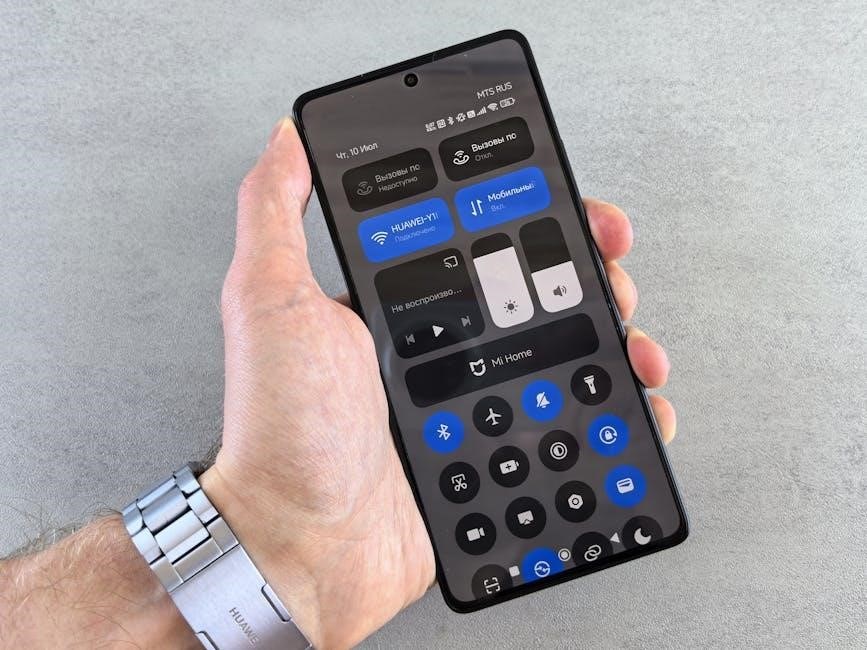The Allen Cognitive Level Screen (ACLS) is a widely used assessment tool in occupational therapy to evaluate cognitive functioning. It helps identify an individual’s cognitive level‚ ranging from 1 to 6‚ based on their ability to perform specific tasks‚ such as leather lacing. This tool is particularly useful for assessing clients with dementia‚ Alzheimer’s disease‚ or other cognitive disabilities. By measuring problem-solving‚ learning‚ and adaptive skills‚ the ACLS provides insights into a person’s functional abilities‚ guiding personalized treatment plans and interventions.
Overview of the ACLS and Its Purpose
The Allen Cognitive Level Screen (ACLS) is a standardized assessment tool designed to evaluate an individual’s cognitive functioning‚ particularly for those with cognitive disabilities such as dementia or Alzheimer’s disease. Its primary purpose is to identify the cognitive level of clients‚ ranging from 1 to 6‚ based on their ability to perform specific tasks. The ACLS uses practical activities‚ such as leather lacing‚ to observe cognitive processes like problem-solving‚ memory‚ and adaptive skills. This tool is widely used in occupational therapy to guide treatment plans and interventions. By providing a clear framework‚ the ACLS helps practitioners understand a client’s strengths‚ needs‚ and learning potential‚ enabling tailored interventions to enhance daily functioning and independence. The ACLS is valued for its portability‚ ease of administration‚ and non-invasive nature‚ making it accessible in various clinical settings.
Importance of Cognitive Assessment in Occupational Therapy
Cognitive assessments are fundamental in occupational therapy as they provide insights into a client’s mental processes‚ such as memory‚ problem-solving‚ and decision-making. These evaluations enable therapists to understand how cognitive abilities impact daily functioning and participation in meaningful activities. By identifying strengths and deficits‚ practitioners can create personalized interventions to enhance independence and adaptability. Tools like the Allen Cognitive Level Screen (ACLS) play a crucial role in this process‚ offering a structured framework to guide therapy plans. Effective cognitive assessment ensures that interventions are tailored to the individual’s needs‚ fostering optimal outcomes and improving quality of life. This approach emphasizes the integration of cognitive strategies into daily routines‚ making it essential for addressing the unique challenges faced by clients with cognitive impairments.

Understanding the Allen Cognitive Levels
The Allen Cognitive Levels are a hierarchical framework assessing cognitive abilities from basic to complex; The ACLS scoring guide helps determine an individual’s level‚ guiding therapy strategies.
Definition and Hierarchy of the Six Cognitive Levels
The Allen Cognitive Levels are a sequential framework defining cognitive functioning from basic to advanced abilities. Level 1 represents the simplest motor actions without cognitive demands‚ while Level 6 reflects complex problem-solving and abstract thinking. Each level builds on the previous one‚ forming a cumulative hierarchy. The ACLS scoring guide categorizes individuals into these levels based on their performance in tasks like leather lacing‚ which assesses problem-solving‚ learning‚ and adaptive skills. This hierarchy helps occupational therapists understand the progression of cognitive abilities and design targeted interventions. By identifying a client’s cognitive level‚ therapists can tailor treatment plans to their specific needs‚ ensuring effective support for daily functioning and skill development.
Cognitive Level 1: The Foundation of Cognitive Functioning
Cognitive Level 1 represents the most basic stage of cognitive functioning‚ characterized by the ability to perform simple‚ voluntary motor actions. At this level‚ individuals rely heavily on external cues to guide their actions and may struggle with initiating tasks independently. Problem-solving abilities are minimal‚ and there is a limited capacity for learning new skills. The focus is on fundamental motor skills‚ such as lacing or tracing‚ which are performed with assistance. Errors are not self-corrected‚ and the individual may not demonstrate an understanding of the task’s purpose. This level serves as the foundation for higher cognitive processes‚ emphasizing sensory-motor integration and basic functional abilities. It is the starting point for assessing cognitive potential and planning appropriate interventions.
Cognitive Level 2: Emerging Problem-Solving Abilities
Cognitive Level 2 marks the emergence of basic problem-solving skills‚ where individuals begin to demonstrate voluntary motor actions with greater independence. At this stage‚ they can correct simple errors‚ such as twists or crosses in lacing‚ when pointed out. Motor control improves‚ allowing for more precise movements‚ though tasks may still require external guidance. Individuals at this level start to initiate activities independently but may need supervision to complete them successfully. Problem-solving is limited to concrete situations‚ and learning new skills remains challenging. This level reflects the early development of adaptive skills‚ with a focus on improving functional performance through structured support and cues. It is a transitional phase‚ building on the foundational abilities of Level 1 while laying the groundwork for more complex cognitive functions in higher levels.
Cognitive Level 3: Development of Adaptive Skills
Cognitive Level 3 signifies the development of adaptive skills‚ where individuals demonstrate improved problem-solving abilities and motor control. They can correct errors independently‚ such as untwisting stitches or redoing lacing mistakes without prompting. This level reflects enhanced independence in performing tasks‚ though some external cues or guidance may still be necessary. Individuals at this stage can initiate and complete simple activities with greater accuracy‚ showing better adaptability to new situations. Their ability to follow instructions and generalize skills to similar tasks improves‚ indicating a stronger foundation for functional performance. This level highlights the progression from basic problem-solving to more complex‚ adaptive behaviors‚ laying the groundwork for further cognitive development in subsequent levels.

Cognitive Level 4: Advancement in Learning and Memory
Cognitive Level 4 marks a significant advancement in learning and memory‚ where individuals consistently demonstrate problem-solving abilities and can complete tasks independently. They exhibit improved recall and the capacity to apply previously learned skills to new situations. At this level‚ motor skills are refined‚ enabling precise and efficient task execution. Error correction becomes more automatic‚ with minimal need for external cues. This stage reflects enhanced cognitive flexibility‚ as individuals can adapt strategies to address challenges. Their ability to generalize learning and apply it to various contexts underscores their growing independence in daily activities. The advancements in learning and memory at this level are critical for mastering more complex tasks and achieving higher levels of cognitive functioning.
Cognitive Level 5: Complex Problem-Solving and Reasoning
Cognitive Level 5 is characterized by the ability to engage in complex problem-solving and reasoning. Individuals at this level can perform intricate tasks requiring logical thinking and adaptability. They demonstrate the capacity to use tools effectively‚ understand abstract concepts‚ and apply knowledge to novel situations. Problem-solving becomes more efficient‚ with the ability to anticipate outcomes and adjust strategies accordingly. At this stage‚ individuals can correct errors independently and demonstrate a high level of cognitive flexibility. Their reasoning skills enable them to handle multifaceted challenges‚ making them more independent in daily functioning. This level reflects a significant advancement in cognitive abilities‚ preparing individuals for the mastery seen in the next level.
Cognitive Level 6: Mastery of Cognitive Processes
Cognitive Level 6 represents the highest level of cognitive functioning‚ where individuals demonstrate mastery of cognitive processes. At this stage‚ they can independently perform complex tasks‚ requiring advanced problem-solving and abstract thinking. These individuals exhibit exceptional adaptability‚ effortlessly correcting errors and adapting strategies without guidance. Their ability to use tools‚ understand intricate concepts‚ and apply knowledge to diverse situations is unparalleled. Cognitive flexibility is a hallmark of this level‚ enabling them to navigate multifaceted challenges with ease. This mastery of cognitive processes supports advanced daily functioning‚ independence‚ and the ability to learn and adapt in dynamic environments. It is the culmination of cognitive development‚ reflecting peak problem-solving and reasoning capabilities.

Scoring and Interpretation of the ACLS
The ACLS scoring process involves evaluating task performance to determine cognitive levels‚ providing insights into problem-solving‚ learning‚ and adaptive abilities. Results guide personalized treatment plans and interventions.
The Scoring Process: A Step-by-Step Guide
The ACLS scoring process involves a structured approach to assess cognitive functioning. The occupational therapist initiates the task‚ such as leather lacing‚ and provides verbal or demonstrated cues if needed. The client is allowed to perform the activity independently‚ and their actions are observed for problem-solving and error correction. The therapist notes the highest level of cognitive functioning demonstrated‚ focusing on the client’s ability to complete tasks and correct mistakes. The final score is determined based on the client’s performance‚ with specific criteria for each cognitive level. This step-by-step evaluation ensures accurate and reliable results‚ guiding further clinical decisions and interventions.
Understanding the ACLS Scoring Criteria
The ACLS uses a standardized scoring system to evaluate cognitive abilities across six levels. Each level reflects specific functional capacities‚ from basic sensory-motor skills at Level 1 to advanced problem-solving at Level 6. The scoring criteria assess the client’s ability to initiate tasks‚ follow instructions‚ and correct errors independently. For example‚ at Level 3‚ clients demonstrate adaptive skills by completing tasks with minimal cues‚ while Level 5 involves complex reasoning and problem-solving. The scoring is cumulative‚ with higher levels building on the abilities of the previous ones. This hierarchical structure ensures that the ACLS provides a clear and comprehensive assessment of cognitive functioning‚ aiding therapists in developing targeted interventions.
Interpreting Results for Clinical Decision-Making
Interpreting ACLS results involves analyzing the client’s cognitive level to inform clinical decisions. Scores range from 1 to 6‚ with higher levels indicating greater cognitive complexity. Level 1 reflects basic sensory-motor skills‚ while Level 6 demonstrates advanced reasoning. Clinicians use these scores to identify functional abilities‚ set realistic goals‚ and tailor interventions. For instance‚ a client at Level 3 may require support with daily tasks but can learn through trial and error. Results also guide the development of adaptive strategies and environmental modifications. By understanding the client’s cognitive profile‚ therapists can enhance participation in meaningful activities and improve overall quality of life. Accurate interpretation ensures personalized and effective care plans aligned with the client’s needs and abilities.

Practical Applications of the ACLS
The ACLS is widely used in occupational therapy to assess cognitive levels‚ guiding therapy plans for clients with dementia‚ Alzheimer’s‚ or other cognitive impairments‚ enhancing clinical decision-making.
Using ACLS in Occupational Therapy Practice
The Allen Cognitive Level Screen (ACLS) is a valuable tool in occupational therapy‚ enabling therapists to assess cognitive functioning and guide intervention strategies. By evaluating an individual’s ability to perform tasks like leather lacing‚ the ACLS helps determine their cognitive level‚ which ranges from 1 to 6. This assessment is particularly useful for clients with dementia‚ Alzheimer’s disease‚ or other cognitive impairments. The scoring guide provides clear descriptions of functional performance abilities‚ allowing therapists to tailor treatment plans to the individual’s needs. The ACLS also serves as a quick and effective method for estimating initial cognitive levels‚ ensuring targeted and person-centered care. Its practical application supports therapists in enhancing clients’ daily functioning and problem-solving skills‚ making it an essential resource in occupational therapy practice.
Assessing Clients with Dementia and Alzheimer’s Disease
The Allen Cognitive Level Screen (ACLS) is a practical tool for assessing individuals with dementia and Alzheimer’s disease‚ providing insights into their cognitive and functional abilities. By observing how clients perform tasks like leather lacing‚ therapists can identify specific cognitive deficits and determine the appropriate level of support needed. The ACLS evaluates problem-solving‚ memory‚ and adaptive skills‚ which are often impaired in these conditions. The scoring guide offers clear descriptions of performance abilities‚ helping therapists develop personalized care plans. This assessment is particularly useful for tracking cognitive decline and measuring the effectiveness of interventions over time. It serves as a valuable resource for occupational therapists working with clients who have dementia or Alzheimer’s‚ enabling them to provide tailored and effective support.
Integrating ACLS Results into Treatment Plans
Integrating ACLS results into treatment plans is crucial for creating personalized and effective interventions. The ACLS provides a clear framework for understanding a client’s cognitive level‚ which directly informs goal setting and activity design. By aligning treatment strategies with the client’s specific cognitive abilities‚ therapists can enhance engagement and progress. The ACLS scoring guide offers detailed descriptions of functional performance‚ enabling therapists to tailor activities to the client’s strengths and needs. This approach ensures that interventions are both realistic and achievable‚ fostering independence and quality of life. Regular reassessment with the ACLS allows for ongoing adjustments to treatment plans‚ ensuring they remain relevant as the client’s abilities evolve. This systematic integration of ACLS results promotes a client-centered and adaptive approach to occupational therapy.

Comparative Analysis with Other Cognitive Assessments
The ACLS stands out for its unique focus on observable motor actions and adaptive skills‚ distinguishing it from other cognitive assessments that rely solely on verbal or written responses.
ACLS vs. Other Cognitive Screening Tools

The Allen Cognitive Level Screen (ACLS) is distinct from other cognitive assessments due to its focus on observable motor actions and adaptive skills. Unlike tools like the Mini-Mental State Examination (MMSE) or Montreal Cognitive Assessment (MoCA)‚ which rely heavily on verbal and written responses‚ the ACLS uses practical tasks such as leather lacing to evaluate problem-solving and learning abilities. This hands-on approach makes it particularly effective for assessing individuals with limited verbal communication or those in early stages of cognitive decline. Additionally‚ the ACLS provides a clear hierarchy of cognitive levels‚ offering a structured framework for guiding interventions. While other tools may focus on broader cognitive functions‚ the ACLS excels in measuring functional performance and adaptability‚ making it a valuable complement to other assessments in occupational therapy practice.
Unique Features of the ACLS
The ACLS stands out for its unique combination of cognitive and motor assessments‚ utilizing tasks like leather lacing to evaluate both mental processing and physical dexterity. Unlike other tools‚ it focuses on an individual’s ability to correct errors and adapt to challenges‚ providing a comprehensive view of problem-solving abilities. The ACLS also offers a hierarchical structure‚ with six distinct cognitive levels‚ allowing for precise tracking of progress over time. Its emphasis on functional performance makes it highly practical for occupational therapy‚ guiding tailored interventions. Additionally‚ the ACLS is non-verbal‚ making it accessible for diverse populations‚ including those with language barriers or communication difficulties; This blend of adaptability‚ practicality‚ and detailed assessment makes the ACLS a valuable tool in cognitive evaluation and rehabilitation.

Reliability and Validity of the ACLS
The ACLS is recognized for its reliability and validity in assessing cognitive functioning. Its standardized administration ensures consistent results‚ while research supports its effectiveness in measuring cognitive levels accurately.
Research Supporting the ACLS as a Reliable Tool
The ACLS has been extensively studied‚ with research confirming its reliability as an assessment tool. Studies demonstrate that the ACLS consistently measures cognitive levels across diverse populations‚ including those with dementia and Alzheimer’s disease. Its ability to accurately predict functional performance supports its use in clinical settings. The tool’s standardized administration and scoring criteria ensure consistency‚ making it a trusted resource for occupational therapists. Furthermore‚ the ACLS has been validated against other cognitive assessments‚ reinforcing its credibility. These findings highlight the ACLS as a dependable instrument for evaluating cognitive functioning and guiding therapeutic interventions effectively.
Validity in Measuring Cognitive Functioning
The ACLS has demonstrated strong validity in assessing cognitive functioning‚ particularly in evaluating problem-solving‚ learning‚ and adaptive skills. The tool accurately measures global cognitive processing capacities and performance abilities‚ aligning with the Cognitive Disabilities Model (CDM). Its structured tasks‚ such as leather lacing‚ provide clear insights into an individual’s cognitive levels‚ from basic to complex abilities. The ACLS is widely recognized for its ability to identify cognitive impairments in conditions like Alzheimer’s disease and dementia. By focusing on observable behaviors and functional performance‚ the ACLS ensures reliable and valid results‚ making it a valuable instrument for guiding therapeutic interventions and improving client outcomes.

Resources for Further Learning
The Allen Cognitive Level Screen Scoring PDF guide offers detailed instructions and examples for accurate assessment. Additional training materials and resources are available online to enhance understanding and application of the ACLS-5 framework.
Accessing the Allen Cognitive Level Screen Scoring PDF
To access the Allen Cognitive Level Screen Scoring PDF‚ visit the official website or authorized distributors. The ACLS-5 manual provides detailed scoring guidelines‚ examples‚ and instructions for administering the tool. It includes step-by-step explanations for evaluating cognitive levels‚ from 1 to 6‚ based on task performance. The PDF also offers practical tips for interpreting results and integrating them into treatment plans. For professionals‚ additional training materials and resources are available online to deepen understanding. Ensure you download the most recent version‚ as updates like the 2009 revision may include improved methodologies. If the primary source is inaccessible‚ consider institutional subscriptions or reaching out to the site owner for assistance.
Recommended Reading and Training Materials

For a deeper understanding of the Allen Cognitive Level Screen‚ several resources are available. The ACLS-5 manual is a comprehensive guide‚ detailing scoring procedures‚ interpretation‚ and practical applications. Online tutorials and workshops offer hands-on training‚ focusing on administering the assessment and integrating results into treatment plans. Additionally‚ case studies and clinical examples provide real-world insights‚ helping practitioners apply the ACLS effectively. The Allen Cognitive Scale of Levels and Modes of Performance is another valuable resource‚ offering detailed guidelines for interventions. Professionals can also access training materials through occupational therapy organizations and educational platforms. These resources are essential for mastering the ACLS and enhancing clinical decision-making skills.
The Allen Cognitive Level Screen (ACLS) is a vital tool in occupational therapy‚ providing insights into cognitive functioning and guiding personalized interventions for individuals with cognitive disabilities.
The Allen Cognitive Level Screen (ACLS) is a standardized tool used to assess cognitive functioning‚ particularly for individuals with dementia or Alzheimer’s disease. It evaluates problem-solving‚ learning‚ and adaptive skills through tasks like leather lacing‚ categorizing individuals into six cognitive levels. These levels range from basic cognitive functioning to complex problem-solving abilities. The ACLS is significant as it provides a framework for occupational therapists to design personalized treatment plans‚ ensuring interventions are tailored to the individual’s cognitive capacity. The ACLS scoring guide offers clear interpretation criteria‚ aiding in clinical decision-making. Its widespread use underscores its reliability and validity in assessing cognitive disabilities‚ making it a cornerstone in occupational therapy practice for enhancing functional performance and daily living skills.
Future Directions in Cognitive Assessment
Future advancements in cognitive assessment tools like the ACLS may focus on integrating technology‚ such as digital platforms‚ to enhance accuracy and accessibility. AI-driven scoring systems could streamline the evaluation process‚ reducing human error and providing real-time results. Additionally‚ there is a growing emphasis on cultural adaptability to ensure assessments like the ACLS are effective across diverse populations. Remote assessment capabilities could also expand‚ allowing practitioners to evaluate clients in various settings. Furthermore‚ combining the ACLS with other cognitive assessments may offer a more comprehensive understanding of an individual’s abilities. Continuous research and validation of the ACLS will ensure its relevance in evolving healthcare landscapes‚ addressing emerging cognitive disabilities and improving intervention strategies. These innovations aim to enhance the tool’s utility in supporting individuals with cognitive impairments.